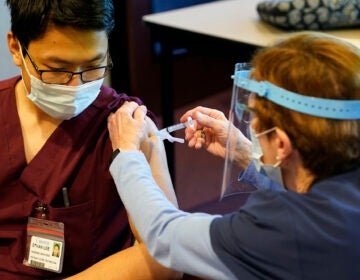What do I need to know about the omicron variant?
Is omicron more contagious? Does omicron cause more severe illness than delta? WHYY's Health Desk Help Desk shares what you need to know about the fast-spreading variant.
Listen 5:21
A person takes COVID-19 test at mobile testing site near Grand Central Terminal on Friday, Dec. 3, 2021, in New York. (AP Photo/Yuki Iwamura)
Ask us about COVID-19: What questions do you have about the coronavirus and vaccines?
This is one of a series of articles in which reporters from WHYY’s Health Desk Help Desk answer questions about vaccines and COVID-19 submitted by you, our audience.
Scientists are learning more about the omicron variant of the coronavirus every day. It’s been reported in at least 48 states and 89 countries, according to health officials. In the United States, it accounted for about 73% of new cases, the Centers for Disease Control and Prevention said Dec. 20.
In many countries, the number of new omicron infections has been doubling every two days, and has become the dominant variant.
WHYY’s Health Desk Help Desk shares what you need to know.
Is omicron more contagious?
Though it’s difficult to prove, the data shows that omicron does appear to be more contagious and spreads more quickly than other coronavirus variants. In South Africa, the rise in omicron cases has been steeper than any other surge over the course of the pandemic.
A new study from the University of Hong Kong that is currently under peer review finds the variant multiplies 70 times faster in the human bronchial tubes than the initial coronavirus infections or the delta variant.
Does omicron cause more severe illness than other variants?
Its effects appear to be less severe than those of other variants, but scientists need more data to get a clear answer.
Among the people infected with omicron in the United States, most reported mild symptoms, but that might be because they had already been vaccinated. The University of Hong Kong study also found that omicron infection in the lungs is significantly less than with the original virus strain.
Researchers need to compare omicron’s effects among people with different vaccine statuses, those who have previously had COVID-19, and people with different medical histories.
Even though omicron might cause less severe illness, its greater contagiousness sparks concern. If a person infected with omicron can spread the virus to more people than was the case with previous variants, everyone has a greater chance of getting infected. Though a young, healthy person might have milder symptoms with omicron, they’re more likely to spread the variant to someone else who is at greater risk of severe illness.
“It’s exponential, because every person who gets infected then infects more people,” said Dr. John Wherry, director of the University of Pennsylvania’s Institute of Immunology. “If that’s the case, even if the disease is milder on average, if you have a substantial increase in the number of cases, it’s still going to be a net increase in the total number of people who end up with severe disease or hospitalized.”
Does omicron evade current vaccines?
Omicron has more than 50 mutations, with more than 30 in the coronavirus’ spike protein, which increases its ability to infect the body.
Data on the Pfizer vaccine indicates that it still protects people from severe illness, but that they might be more likely to get a mild infection.
When examining the omicron variant, researchers found that protection against overall infection declined to 30%, while protection against severe illness remained quite high at 70%. That’s because memory B and T cells that fight the virus after it enters the body remain strong. Antibodies, on the other hand, which act like a shield to prevent the virus from entering the body, wane over time and may not be as strong against omicron. There’s likely about a 30-fold reduction in antibodies compared to delta, the data suggests.
However, individual circumstances such as age and pre-existing medical conditions do need to be factored in, experts say.
“The bottom line is there seems to be considerable escape from the antibodies induced by vaccination,” Wherry said.
On the other hand, he said, omicron likely will have a minimal effect on the ability of T cells to fight the virus.
“So we’re seeing that there are some of these breakthrough infections that are occurring, but a very small percentage of those are actually progressing to severe disease, and typically very, very infrequently in otherwise healthy people,” Wherry said. “And so a lot of those breakthrough [cases with] severe disease are occurring in people that have been either a long time since vaccination or have underlying immunological problems or comorbidities.”
How a person interprets the data might depend on what they expect from the COVID vaccine, said Dr. Paul Offit, director of the Vaccine Education Center and professor of pediatrics in the Division of Infectious Diseases at Children’s Hospital of Philadelphia.
“I would think the goal should be the goal of all vaccines, which is to prevent serious illness — the kind of illness that causes you to go to the doctor’s office, go to the hospital or the ICU,” he said. “This vaccine appears to do that and consistently does that. So I think that should be reassuring to people.”
Offit added that if a person gets a mild infection after vaccination, the vaccine is still doing its job.
“Unfortunately, we have labeled that kind of infection a breakthrough infection, and it’s really not a breakthrough because breakthrough implies failure. And if you’ve been vaccinated and you have mild symptoms, that’s OK,” Offit said. “That’s what we want from the flu vaccine, that’s what we want from the coronavirus vaccine, that’s what we’d want from the whooping cough vaccine. So I think those are all wins, but we haven’t defined them that way, which is too bad and unfair to this vaccine.”
What’s my risk with omicron?
Some questions need to be answered to understand your risk, Wherry said:
- Are you vaccinated? Your risk is much higher if you’re not.
- If you are vaccinated, how long ago was your last dose? Your risk increases the farther out you are from your last shot. The same applies for people who have previously been infected with the coronavirus.
You should also consider your medical risk factors, Wherry said.
“Do you have a compromised immune system? Are you of an older age? Do you have other medical issues that might predispose you to severe COVID? Do you have diabetes? Do you have cardiovascular disease? Are you overweight?” he said. “These kinds of things can also mean that even what would be a relatively mild case of COVID in someone young and with no other medical conditions could become quite severe in someone older with diabetes and cardiovascular disease.”
Your lifestyle also can play a role in risk calculation, Wherry said. Being in large crowds and not wearing a mask increases your risk, for example.
“The amount of virus you may be exposed to could be considerably higher and could increase the chances that you’re going to get severe disease, even if you’re vaccinated,” Wherry said.
And if you’re reasonably healthy and take precautions?
“I think if you’ve gotten two doses of the vaccine, you can feel confident that you are protected against serious illness,” Offit said.
“I think if you’ve gotten the third dose, I think you should feel confident that you’re protected against even mild illness, at least for a certain period of time, however long it takes for those neutralizing antibodies to again fade after the third dose, which could be six months, nine months. We’ll see,” Offit said. “But it does afford you better protection against mild illness for a certain period of time to be determined.”
Delta still is the biggest problem going into the holidays, Wherry said. If you’re going to gather, a booster is a good idea, he said, stressing that getting tested before and after the gathering should also be a top priority.
Does omicron mean boosters are more important?
Early data suggests that boosters should help fight against omicron, because antibodies increase significantly after getting them.
Offit said a lot will depend on upcoming data that will determine whether omicron is more or less virulent, and comparisons of patients who have received only two doses versus two doses and a booster.
“My prediction is that what you’ll find is that there really isn’t any difference in protection against serious illness, but that there would be a difference in protection against mild illness,” he said. “And then the question is: Is that what we want? Do we want to try and protect against mild illness in young, otherwise healthy people?”
Should we be more concerned about omicron or delta?
Both are concerning, Wherry said.
“I think something that’s getting lost in the attention on omicron is that we are in the middle of a massive wave of delta, where we’re seeing Pennsylvania was the worst state in the country over the last week for new hospitalizations because of COVID-19, and that’s almost uniformly delta,” Wherry said. “We’re seeing an increase in infections being detected in the Philadelphia area at a pretty rapid rate right now. Even though this part of the state is still doing better than other parts, the rate of change is still quite concerning.”
Wherry said it’s almost impossible to compare the variants, because when delta came on the radar, the vaccination rate was much lower than it is today with omicron.
Offit added that we should expect more variants to come, as many people around the world aren’t vaccinated.
“There are vastly under-vaccinated communities [in] which the virus has continued to spread and mutate. So I think what people should do is vaccinate themselves,” he said.
How does a previous infection match up against omicron?
It’s not yet known how a prior case of COVID-19 protects a person from omicron compared to other variants.
However, it was reported that some of the people infected with omicron in South Africa had previous coronavirus infections, implying that reinfection is possible with this variant. Their ages and health conditions need to be taken into consideration to better understand risk.
“But what was clear from that is people who have recovered from previous COVID-19 disease can get infected with omicron,” Wherry said. “I think that’s the simplest thing we can say at this point.”

Saturdays just got more interesting.
WHYY is your source for fact-based, in-depth journalism and information. As a nonprofit organization, we rely on financial support from readers like you. Please give today.






![CoronavirusPandemic_1024x512[1]](https://whyy.org/wp-content/uploads/2020/03/CoronavirusPandemic_1024x5121-300x150.jpg)

